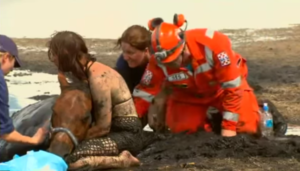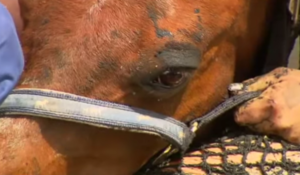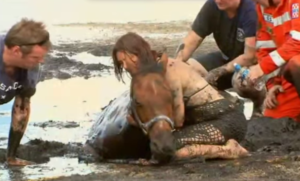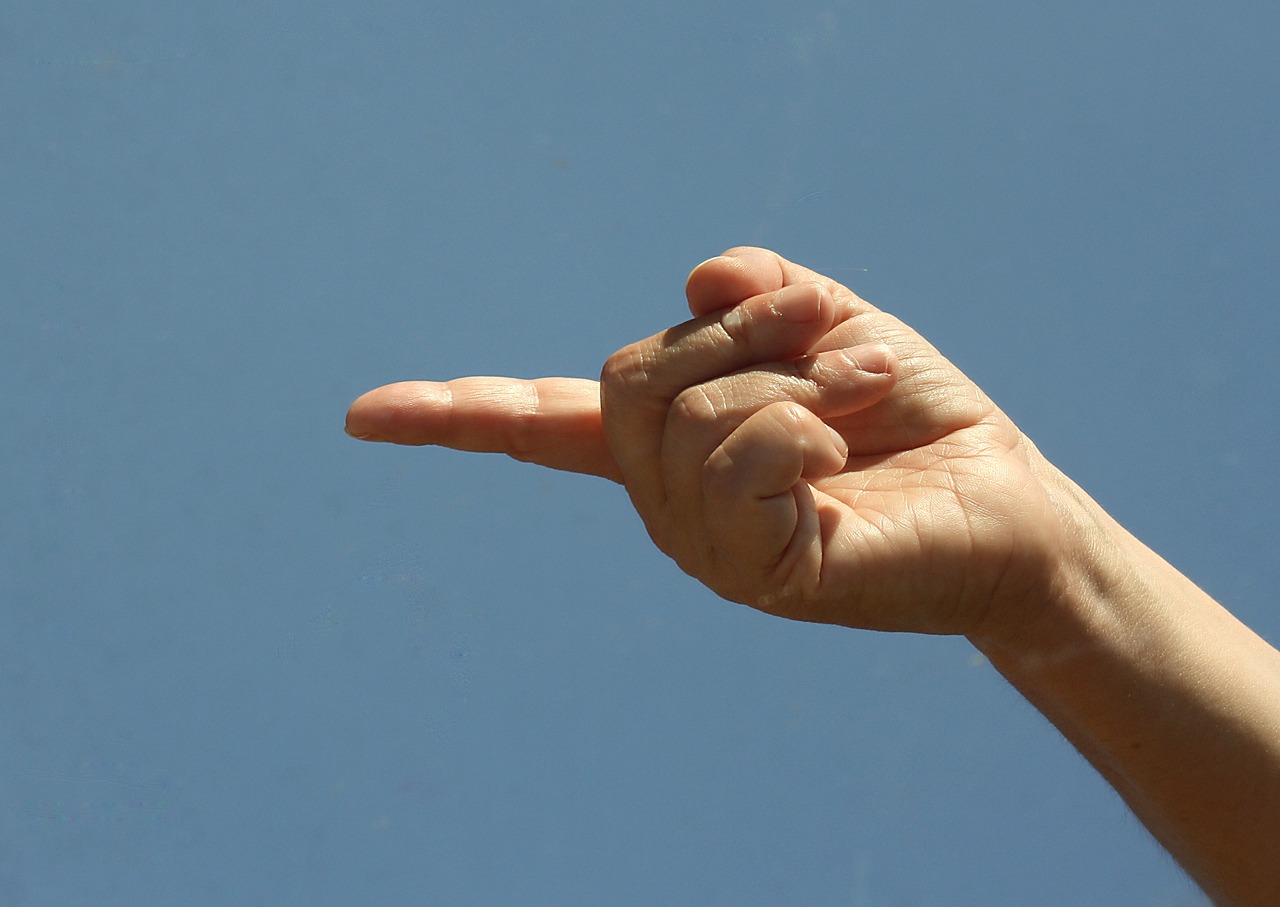Anyone who has been to the ocean knows how unpredictable it can be. One of the most dangerous things about the ocean is the tide. If you are in the wrong place at the wrong time, the tide can turn deadly.

The tide can rise quickly, swallowing people and animals in seconds. In some cases, it can lead to a slow and painful death. This is what nearly happened to an 18-year-old horse named Astro.
Astro’s owner, Nicole Graham, and her daughter were enjoying a ride on the beach near Geelong, south of Melbourne, Australia. But soon, the horses wandered into soft sand, which quickly turned into a muddy trap.

Nicole’s daughter and her horse managed to escape, but Nicole and Astro were not so lucky. They sank deeper into the mud, and Astro was soon stuck up to his neck in thick clay, in danger of choking. For the next three hours, Nicole stayed by Astro’s side, fighting to keep him alive.
As the minutes passed, the situation became more desperate. Nicole had to calm her 1,000-pound (450 kg) horse to prevent him from sinking even deeper into the mud. As the tide started to come in, Astro was getting closer to suffocating. He was also at risk of dying from dehydration and exhaustion.

Thankfully, Nicole’s daughter was able to get to safety and call for help. A rescue team and a veterinarian arrived on the scene. The vet gave Astro a sedative to keep him calm, while Nicole stayed by his side, talking to him to reassure him. The team even called a helicopter, but they couldn’t lift Astro because he was too deeply stuck in the mud for a rope to be tied around him.
The rescue team tried hard to free Astro, but the mud was like quicksand, making it almost impossible to dig him out. As the tide got closer, Nicole feared they wouldn’t be able to save her beloved horse.
Then, a farmer arrived with his tractor. In a last attempt to free Astro, they attached a rope to the tractor and pulled. That’s when the miracle happened. Together, Nicole, the rescue workers, and the farmer managed to pull Astro out of the mud.

You can watch the incredible rescue here:
Nicole, who owns 10 horses, often rides along the beach, but this was the first time one of her horses had gotten stuck.
Luckily, this story had a happy ending. But it shows the importance of being careful around the ocean, even in familiar places.
Most of all, this story is a beautiful example of the powerful bond between humans and animals. It shows that love and determination can make miracles happen!
My MIL Put Spyware in My Phone — She Didn’t Like My Surprise in Response

My MIL Put Spyware in My Phone — She Didn’t Like My Surprise in Response
Living with my mother-in-law has been a nightmare. But when she insisted on fixing my broken phone, I thought it was a small step toward mending our strained relationship. Little did I know that her helpful gesture would lead to a shocking discovery that forced me to confront her schemes and ultimately redefine our household’s boundaries.

A woman and her mother in law arguing | Source: Pexels
My life has been hell ever since my Mother-In-Law (MIL) moved in with me and my husband. My name is Emily, 25, and I have been married to my husband Andrew, 28, for five years now. We stay with my MIL, Sophia, who moved in with us due to ill health about three years ago.
From the day I married her son, she made it clear that she thought I wasn’t good enough for him. Our relationship was strained at best, and we did our best to stay out of each other’s paths to keep the peace at home.

Two women who are not getting along | Source: Vecteezy
Now, a few months ago, I broke my phone, and my MIL, who was watching me closely on that day, had a whole rant about how “irresponsible I was” and how I should act “more mature.” Sophia complained incessantly about the cost of fixing the phone, grumbling about how much money I was wasting and how this could have been avoided if I had been more careful.

A mother-in-law repremanding her son’s wife | Source: Pexels
Yet, despite her constant complaints, she was surprisingly adamant about taking my phone to get it fixed herself since she stayed at home. I was a bit confused about why she wanted to go so badly, but I just let her go, as I thought she was making a kind gesture to bring us close. She came back with my phone fixed, and everything seemed normal.

A woman using her working phone | Source: Pexels
Fast forward two months, I noticed how my phone started to act weird. I asked Sophia if she had taken it to a reputable technician. “Of course,” she said, with a dismissive wave of her hand. “I took it to the best place in town.”
“I’m asking because the phone has been acting really weird,” I explained.
Sophia rolled her eyes and scoffed. “You’re being dramatic, Emily. It’s probably just your imagination.”

A woman trying to figure out what is wrong with her phone | Source: Vecteezy
I decided to leave the matter alone but at work weird data-like things kept popping up on its screen, making it almost impossible for me to use the phone. So, after work, I took the phone to the local tech support kiosk.
To my SHOCK, the tech support guy opened it up and said, “Someone put a chip in your phone.”
I blinked, trying to process his words. “A chip? What do you mean?”

A woman with her phone that is giving her problems | Source: Pexels
He pointed at a small, unfamiliar piece of hardware. “This chip allows someone to see your messages, your location, and your emails. It’s a form of spyware.”
My heart raced. “Are you serious? Who would do this?”
He shrugged. “It’s hard to say, but it must be someone who had access to your phone for a while.”

A spyware transmitting data and information | Source: Vecteezy
The only person who could do it was Sophia since my husband worked in another city for three months. I was mad as HELL and as I left the shop, I quickly formulated a plan.
In my mind, I thought, ‘She wants to spy on me? Okay, then I’ll give her something to see.’ So, I decided to leave the chip in my phone.

A woman plotiing | Source: Pixabay
I started signing up for adult shops, videos, and other 18+ content. Then, I began driving to men’s clubs and sending explicit messages to my husband, all while knowing my MIL was watching every move. My MIL became increasingly annoying but she couldn’t say anything specific about what was happening.

An annoyed woman | Source: Vecteezy
When my husband came back, my MIL set us at the table and began accusing me of cheating and all the things she had seen.
“I can’t believe this, Emily!” Sophia started, her face flushed with anger. “I’ve seen the messages you’ve been sending to strange men! And the places you’ve been visiting! Adult shops? Men’s clubs? How could you do this to my son?”

A mother-in-law making accusations | Source: Vecteezy
Andrew looked bewildered. “What are you talking about, Mom?”
Sophia continued, her voice rising. “I’ve seen it all on her phone! Explicit messages, shady locations, and subscriptions to all sorts of adult content. She’s been betraying you, Andrew!”
“How do you know all this?” I asked calmly.
She hesitated, then blurted out, “I saw it on your phone! There’s a chip that… well, it shows everything you’re doing!”

A woman using her phone | Source: Pexels
I feigned shock. “A chip? In my phone? How could that happen?” I exclaimed, widening my eyes in disbelief. “Who would do such a thing? This is outrageous! How did it even get there?”
My MIL’s face turned red. “I… I put it there to keep an eye on you. I knew you were up to something! I knew you were not good enough for my son. A liar and a cheat!”

An accusing finger | Source: Pixabay
I smirked a hint of satisfaction in my voice. “Oh, I knew about the chip. And I decided to have some fun with it. You wanted to spy on me? I gave you a show.” I leaned in slightly, my eyes glinting with defiance. “Every adult shop, every explicit message, every shady location—you saw exactly what I wanted you to see. How does it feel to be played at your own game?”

A woman smirking with satisfaction | Source: Pixabay
My husband looked between us, stunned. “You both knew? What the hell is going on?”
My MIL stammered, “She was… she was doing all those things on purpose?”
I nodded, laughing. “Yes. To show you that spying on someone is wrong. You invaded my privacy, and I wanted you to see how it feels to be manipulated.”

A woman laughing with satisfaction | Source: Pixabay
My husband finally spoke, his voice firm. “Mom, this is unacceptable. You can’t just spy on people. We need to have boundaries in this house.”
My MIL, looking defeated, muttered, “I… I’m sorry. I didn’t mean for it to go this far.”
“Apology accepted,” I said, “but from now on, let’s respect each other’s privacy. Agreed?”

Mother-in-law and her son’s wife reconclie | Source: Vecteezy
My MIL nodded reluctantly, and my husband added, “We’ll make sure this never happens again.”
And with that, the tension began to dissipate, and we started to rebuild trust, setting clear boundaries for the future.



Leave a Reply